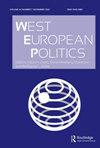Who speaks for manual workers? Unequal congruence in the 2017 German Federal Election
IF 3.6
1区 社会学
Q1 POLITICAL SCIENCE
引用次数: 0
Abstract
AbstractThe rise of right-wing populist parties in Western democracies has led to a renewed interest in theories concerning class-based voting. It is argued that traditional workers’ parties are increasingly being challenged over the working-class vote by the populist radical right because they are perceived as being too culturally liberal for their own electorate. However, while it is established that the views of traditional parties are often incongruent with those of workers, it is not yet clear whether right-wing populist parties fare any better in this regard. Using many-to-many congruence, this article compares the preferences of different social classes and MPs in the 2017 German Federal Election. Three notable findings emerge. First, opinion gaps vary greatly across issues, and occupational groups do not hold fundamentally different views. Second, there are nonetheless significant congruence gaps at the expense of workers. Third, neither left-wing parties’ MPs nor the right-wing populist AfD MPs provide a good fit for workers’ opinions.Keywords: Representationpolicy congruencepolitical partiespolitical inequalityworking class Disclosure statementNo potential conflict of interest was reported by the author(s).Notes1 Although the term ‘left-authoritarian’ can be misleading, I follow the literature cited here and use the term to describe a combination of left-wing economic and conservative cultural positions. In this article, the term does not refer to general authoritarian or anti-democratic attitudes.2 Results can be found in the online appendix.3 Although Golder and Stramski (Citation2010) originally recommended using cumulative frequencies, I follow Andeweg (Citation2011) and Schakel and Hakhverdian (Citation2018) by using probability distribution functions.4 As previously described, I use a bootstrapping technique and work with estimated rather than simple congruence calculations in the following analysis.Additional informationNotes on contributorsMarie KüblerMarie Kübler is a doctoral candidate at the Department of Political Science, University of Mainz. Her research focuses on political representation. [kuebler@politik.uni-mainz.de]谁为体力劳动者说话?2017年德国联邦选举中的不平等一致性
摘要西方民主国家右翼民粹主义政党的兴起,重新引起了人们对阶级选举理论的兴趣。有人认为,传统的工人政党越来越多地受到民粹主义激进右翼在工人阶级选票上的挑战,因为他们被认为对自己的选民来说过于文化自由。然而,虽然传统政党的观点往往与工人的观点不一致,但目前尚不清楚右翼民粹主义政党在这方面是否表现得更好。本文利用多对多一致性,比较了2017年德国联邦选举中不同社会阶层和议员的偏好。有三个值得注意的发现。首先,不同问题的意见分歧很大,职业群体的观点并没有根本的不同。第二,以牺牲员工利益为代价,仍然存在显著的一致性差距。第三,无论是左翼政党的议员还是右翼民粹主义政党德国新选择党(AfD)的议员,都不太适合工人的意见。关键词:代表性政策一致性政党政治不平等工人阶级披露声明作者未报告潜在的利益冲突。注1:虽然“左翼威权主义”这个词可能会误导人,但我还是按照这里引用的文献,用这个词来描述左翼经济立场和保守文化立场的结合。在本文中,这个词并不是指一般的专制或反民主的态度结果可在在线附录中找到虽然Golder和Stramski (Citation2010)最初建议使用累积频率,但我遵循了Andeweg (Citation2011)和Schakel和Hakhverdian (Citation2018)的方法,使用概率分布函数如前所述,在下面的分析中,我使用了一种自举技术,并使用估计的而不是简单的同余计算。作者简介:marie k布勒,德国美因茨大学政治学系博士研究生。她的研究重点是政治代表性。(kuebler@politik.uni-mainz.de)
本文章由计算机程序翻译,如有差异,请以英文原文为准。
求助全文
约1分钟内获得全文
求助全文
来源期刊

West European Politics
POLITICAL SCIENCE-
CiteScore
10.00
自引率
7.10%
发文量
58
期刊介绍:
West European Politics (WEP)has established itself as one of the most authoritative journals covering political and social issues in Western Europe. It has a substantial reviews section and coverage of all national elections in Western Europe. Its comprehensive scope, embracing all the major political and social developments in all West European countries, including the European Union, makes it essential reading for both political practitioners and academics.
 求助内容:
求助内容: 应助结果提醒方式:
应助结果提醒方式:


